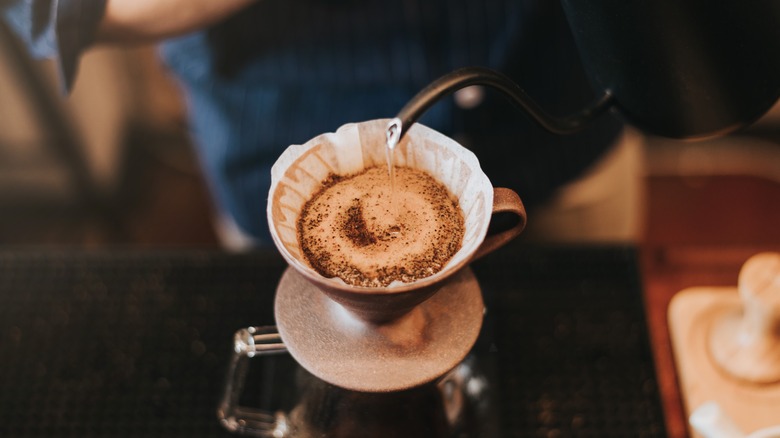Coffee Was Banned In 2 Different Places In The 16th Century
A love for coffee can be found in countless nations around the world. Some countries, like Croatia, have coffee breaks deeply ingrained in their culture, with people spending hours with friends over cups of "kava." Italians, meanwhile, have rules for when to order a cappuccino. (Hint: never after 11 a.m.) Whether taken to go via drive-throughs, or lingered over in a coffee shop, Americans love their brew, even if it often results in a Starbucks vs. Dunkin' Donuts debate. Shockingly, sources say many Brits have dumped their once-treasured tea in favor of the black brew (per Coffee Affection).
Most of us know about the powerful effects of coffee on the brain. According to Healthline, the caffeine in coffee can increase attention and learning, making you feel more alert and better able to think. What you may not know is how in the 16th century, two areas considered coffee so dangerous to society and the health of their people that it was banned.
Coffee or your life
To many devotees, the thought of a life without coffee may sound like a life not worth living. To some, the anticipation of that first sip of hot java is the only thing that gets them out of bed in the morning. Imagine how you would have felt to learn your favorite morning beverage was banned.
According to Atlas Obscura, an official in 16th century Mecca thought coffee drinkers outside a mosque looked like they may be brewing some trouble, and took action. Kha'ir Beg al-Mi'mar felt the only solution was to ban coffee drinking and used politics and religion to support his case. Thankfully, Meccans didn't have to go without their joe for long as the ban only lasted a few weeks.
Another part of the world tried to ban the brew back then, too. Clergymen in 16th century Italy, the home of espresso and the latte, tried to convince the pope to prohibit coffee, calling it "Satan's drink" — until Pope Clement VIII took a sip and declared it worthy of baptism (per The Catholic Gentleman). The rest is history.
The social significance of coffee
Persecution against coffee aficionados didn't end in the 16th century. According to The National Library of Medicine, 200 years later, Swedes were forced to abandon their beloved bean juice when their monarch outlawed it. King Gustav III believed coffee to be dangerous to the health of his subjects and imposed severe penalties for anyone who broke the law. The king was assassinated in 1792 and the ban was lifted in the 1820s.
Old King Gustav was off the mark. According to Hopkins Medicine, coffee has many health benefits, including powerful protections for women against stroke, heart disease, and kidney disease. Coffee drinkers are less likely to be diagnosed with Parkinson's disease, Type 2 diabetes, and Alzheimer's disease. Today in Sweden, the daily custom of "fika" — a coffee and cake break with others — is entrenched in the country's social culture (per Swedish Food).
So, whether you take your coffee iced, black, or Irish, enjoy the camaraderie, taste, and health benefits that come with this once-banned beverage.


